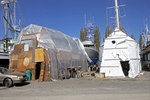Port of Port Townsend commissioners and Al Cairns, environmental compliance officer, on April 8 discussed imposing fines for violating Best Management Practices (BMPs), rules designed to help reduce …
This item is available in full to subscribers.
We have recently launched a new and improved website. To continue reading, you will need to either log into your subscriber account, or purchase a new subscription.
If you had an active account on our previous website, then you have an account here. Simply reset your password to regain access to your account.
If you did not have an account on our previous website, but are a current print subscriber, click here to set up your website account.
Otherwise, click here to view your options for subscribing.
* Having trouble? Call our circulation department at 360-385-2900, or email our support.
Please log in to continue |
|


Port of Port Townsend commissioners and Al Cairns, environmental compliance officer, on April 8 discussed imposing fines for violating Best Management Practices (BMPs), rules designed to help reduce environmental damage.
The port has invested $400,000 in a stormwater treatment system. "We're still by a large order of magnitude over our stormwater standards," Cairns said.
The port does big business in work on commercial vessels and is one of the last do-it-yourself yards (where a boat owner can work on their own boat) in the Puget Sound. Port staff have been working to educate people in the yard about BMPs, but Cairns said "we failed by a substantial amount" in a recent test of a drainage basin, finding more than 6,000 parts per billion of copper. In order to comply with state standards, that needs to be only 147 parts per billion at the outflow pipe running into the bay. Heavy rainfall can "scour" years' worth of copper, zinc and other contaminants, but BMPs must be followed to help the port keep its pollutants within limits.
"We're just asking them to keep a tidy workplace, essentially," Cairns said, pointing out that other ports charge $100 to $500 for noncompliance issues.
Open sanding is by far the most common type of noncompliance, with 37 violations noted since 2013, compared to eight cases of open disk grinding, seven instances of fuel discharge and four of inadequate tarps/airborne controls.
A "culture shift," or change in attitude, toward compliance is going to be the defining factor, Cairns said, "the make-or-break on whether we can keep the permit."
"We're suffering death by 1,000 cuts," Cairns said. "In the case of ... incidents of open sanding ... that's what's killing us" as far as stormwater quality.